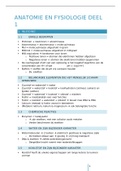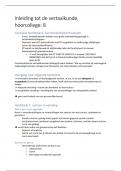Drug Metabolism
- The definition of drug metabolism and why it is important to study them: It is the
chemical alteration of a drug by the body. It is the biotransformation of
pharmaceutical substances in the body so that they can be detoxified. The rate of
metabolism determines the duration and intensity of the drug’s pharmacological
action. Drug metabolism also affects multidrug resistance in infectious diseases and
in chemotherapy in cancer. How?
- Pharmacokinetics: The study of drug metabolism.
- Liver: Major site of drug metabolism but specific drugs undergo biotransformation in
other tissues.
- Xenobiotic: relating to a substance that is a drug and has been made synthetically
that is foreign to the body.
- The major challenge faced by xenobiotic detoxification systems is that they must be
able to remove the almost limitless number of xenobiotic compounds from the
complex mixture of chemical involved in normal metabolism. The solution to this is
an elegant combination of physical barriers and low specificity enzymatic systems
as we will be able to tell from the next few points.
- Hydrophilic drugs compounds do not cross the plasma membrane barrier, this is
because of the lack of specificity for the transporters. Nonpolar and lipid soluble
drugs (non-polar and uncharged) do pass and so it becomes harder to excrete them
because they remain in the tissues and maintain their pharmacological effects for
much longer. Therefore, drug metabolism is requiring converting the lipophilic
compounds into more hydrophilic so they can be excreted. Lipophilic drugs hard to
excrete.
- Which organ usually does this conversion from the lipophilic to the hydrophilic?
The liver. So, the word metabolism (biotransformation) being turning it into more
hydrophilic. The metabolism can be slow or fast dependent on lots of other factors.
- Pharmacokinetics: Focuses on the:
- Absorption: How the drug moves from the site of administration into the
bloodstream.
- Distribution: Journey to the bloodstream to reach the target cells and molecules.
- Metabolism: Describes modification by enzymes to render the drug ineffective –
usually takes place in the liver.
- Elimination: Excretion through urine or faeces.
- First pass: This happens directly like no travel to the target cell before straight to the liver, first
pass and it usually happens with orally
administered drugs: Drugs taken orally are
absorbed through the intestinal wall, to the hepatic portal system in those blood
vessels where metabolism will happen (first pass effect). The first pass effect means
, that the bioavailability of the drug is greatly reduced in the plasma. In certain cases,
metabolism activates but is less common, the first pass effect means that 90% of the
drug may be inactivated. This should be considered when thinking about the dosage
and the therapeutic window.
- Bioavailability = % of dose reaching the bloodstream and in the systemic circulation.
- However, drugs can be metabolised after reaching their target as well: There are
many enzymes that do this.
- Excretion: Kidneys must remove harmful substances; drugs are excreted through bile via
enterohepatic recirculation to the liver again and then excreted through kidneys and the
rest through excretion through faeces.
- What does the therapeutic window mean? The does
range / drug concentration period where the drug
provides effective therapy with minimal toxicity. So,
we must think about the half-life of the drug and the
bioavailability.
- Chemical stability of a drug? Stable in the stomach if taken orally
- Metabolic Stability of a drug? No interactions with other metabolites, how well it can be
metabolised.
- Phase 1 biotransformation: Introduce or unmask the functional groups. The
metabolites that result from it are inactive and can be excreted readily. So a
variety of enzymes try and introduce reactive and polar groups. To increase the
overall polarity so secretion can happen easily.
- Oxidation: meaning loss of H OR addition of oxygen.
- Liver is the main organ where this takes place by the cytochrome P450.
- There is aliphatic or aromatic hydroxylation. (1)
- N-, or S-oxidation. (2)
- N-, O -, S- dealkylation. (3)
- Reduction: Removal of Oxygen OR Addition of Hydrogen: Reactions are catalysed
by reductases present at different sites in the body. Cytochrome P450 system is
involved in some reactions.
- Nitro reduction to hydroxylamine / amine
- The definition of drug metabolism and why it is important to study them: It is the
chemical alteration of a drug by the body. It is the biotransformation of
pharmaceutical substances in the body so that they can be detoxified. The rate of
metabolism determines the duration and intensity of the drug’s pharmacological
action. Drug metabolism also affects multidrug resistance in infectious diseases and
in chemotherapy in cancer. How?
- Pharmacokinetics: The study of drug metabolism.
- Liver: Major site of drug metabolism but specific drugs undergo biotransformation in
other tissues.
- Xenobiotic: relating to a substance that is a drug and has been made synthetically
that is foreign to the body.
- The major challenge faced by xenobiotic detoxification systems is that they must be
able to remove the almost limitless number of xenobiotic compounds from the
complex mixture of chemical involved in normal metabolism. The solution to this is
an elegant combination of physical barriers and low specificity enzymatic systems
as we will be able to tell from the next few points.
- Hydrophilic drugs compounds do not cross the plasma membrane barrier, this is
because of the lack of specificity for the transporters. Nonpolar and lipid soluble
drugs (non-polar and uncharged) do pass and so it becomes harder to excrete them
because they remain in the tissues and maintain their pharmacological effects for
much longer. Therefore, drug metabolism is requiring converting the lipophilic
compounds into more hydrophilic so they can be excreted. Lipophilic drugs hard to
excrete.
- Which organ usually does this conversion from the lipophilic to the hydrophilic?
The liver. So, the word metabolism (biotransformation) being turning it into more
hydrophilic. The metabolism can be slow or fast dependent on lots of other factors.
- Pharmacokinetics: Focuses on the:
- Absorption: How the drug moves from the site of administration into the
bloodstream.
- Distribution: Journey to the bloodstream to reach the target cells and molecules.
- Metabolism: Describes modification by enzymes to render the drug ineffective –
usually takes place in the liver.
- Elimination: Excretion through urine or faeces.
- First pass: This happens directly like no travel to the target cell before straight to the liver, first
pass and it usually happens with orally
administered drugs: Drugs taken orally are
absorbed through the intestinal wall, to the hepatic portal system in those blood
vessels where metabolism will happen (first pass effect). The first pass effect means
, that the bioavailability of the drug is greatly reduced in the plasma. In certain cases,
metabolism activates but is less common, the first pass effect means that 90% of the
drug may be inactivated. This should be considered when thinking about the dosage
and the therapeutic window.
- Bioavailability = % of dose reaching the bloodstream and in the systemic circulation.
- However, drugs can be metabolised after reaching their target as well: There are
many enzymes that do this.
- Excretion: Kidneys must remove harmful substances; drugs are excreted through bile via
enterohepatic recirculation to the liver again and then excreted through kidneys and the
rest through excretion through faeces.
- What does the therapeutic window mean? The does
range / drug concentration period where the drug
provides effective therapy with minimal toxicity. So,
we must think about the half-life of the drug and the
bioavailability.
- Chemical stability of a drug? Stable in the stomach if taken orally
- Metabolic Stability of a drug? No interactions with other metabolites, how well it can be
metabolised.
- Phase 1 biotransformation: Introduce or unmask the functional groups. The
metabolites that result from it are inactive and can be excreted readily. So a
variety of enzymes try and introduce reactive and polar groups. To increase the
overall polarity so secretion can happen easily.
- Oxidation: meaning loss of H OR addition of oxygen.
- Liver is the main organ where this takes place by the cytochrome P450.
- There is aliphatic or aromatic hydroxylation. (1)
- N-, or S-oxidation. (2)
- N-, O -, S- dealkylation. (3)
- Reduction: Removal of Oxygen OR Addition of Hydrogen: Reactions are catalysed
by reductases present at different sites in the body. Cytochrome P450 system is
involved in some reactions.
- Nitro reduction to hydroxylamine / amine










